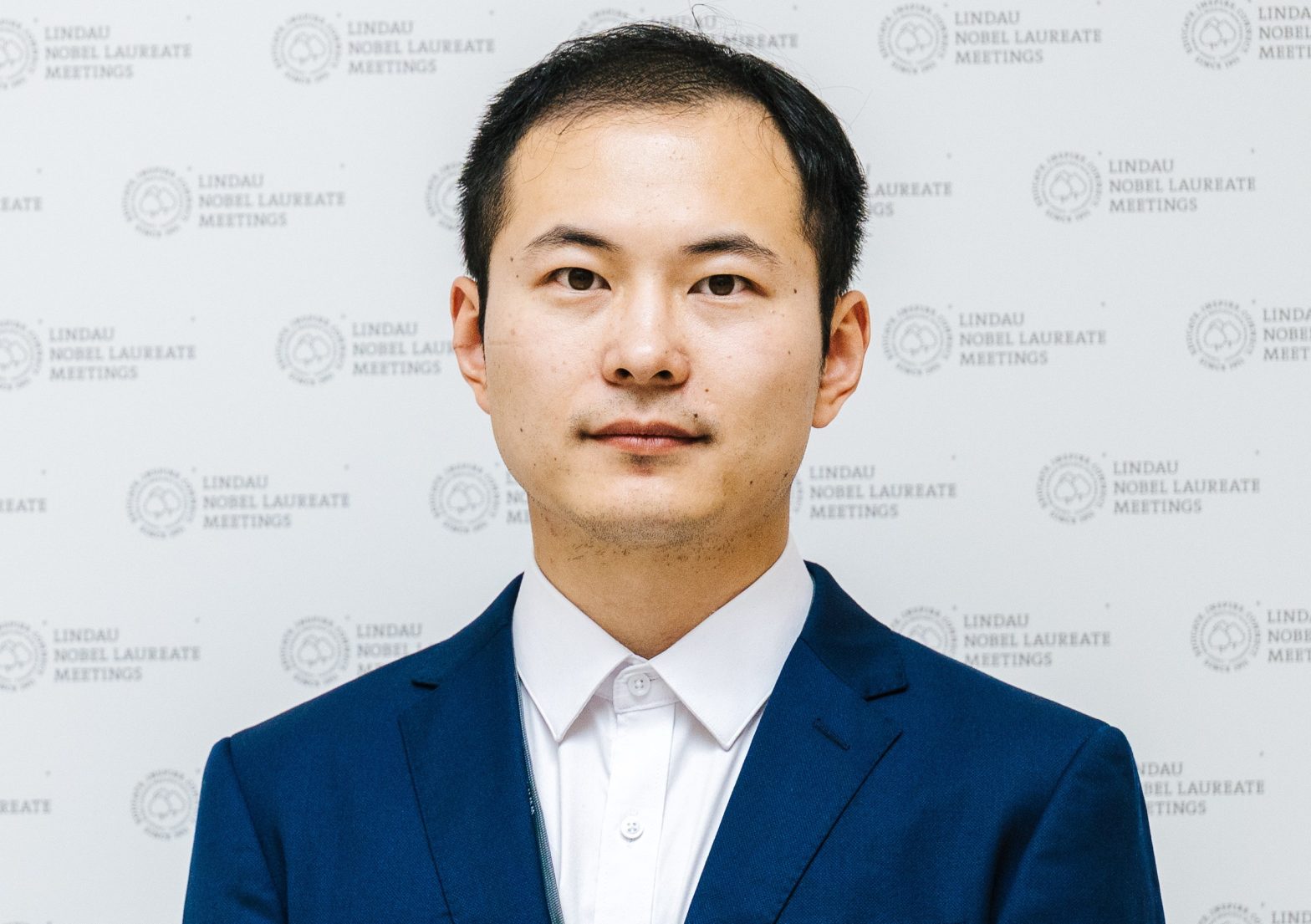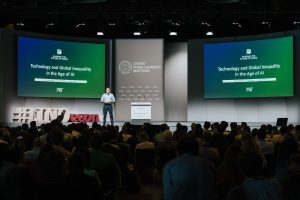I have always been fascinated by how economics helps us make sense of the complexities of our world. It’s a field that connects models to real human challenges, from how markets respond to uncertainty to how we can address urgent issues like climate change.
One of the most thought-provoking sessions I attended at the 8th Nobel Laureates Meeting was Professor Simon Johnson’s lecture on Technology and Global Inequality in the Age of AI. The topic could hardly be more timely. Around the world, there is both excitement and anxiety about artificial intelligence. Will it empower workers and raise living standards? Or will it deepen inequality and displace livelihoods?
Professor Johnson laid out the debate in stark terms. AI has the potential to boost wages and create prosperity for all, but there is a very real risk that it could primarily accelerate automation – replacing human workers with machines and algorithms – without necessarily translating into higher wages. History offers a cautionary tale. During the British Industrial Revolution of 1780-1840, productivity surged, yet wage growth lagged far behind for decades.
At the same time, AI could become a powerful engine of new task creation. More than 60% of U.S. jobs in 2018 simply did not exist in 1940. From 1940 to 1980, task creation was rapid enough to ensure broad-based prosperity. Since the 1980s, however, the pace has slowed, especially for less-educated workers. As a result, automation has steadily eroded ‘good jobs’, while new opportunities have clustered at the high-skill end of the spectrum.
The lecture also highlighted the wide divergence in macroeconomic forecasts about AI. Optimists envision productivity gains spreading broadly, lifting growth in both industrial and developing economies. Pessimists, however, argue that many assumptions are too rosy. Automation may not be as extensive as predicted. Cost savings could take longer than expected. And displaced workers may struggle to find new roles. Research by Acemoglu (2024), for instance, suggests that AI might raise total factor productivity by just 0.66% – far more modest than boosters often claim.
What struck me most was how widely opinions differ. For some, AI represents a transformative leap forward, capable of accelerating science and fuelling an era of abundance. For others, it risks entrenching inequality by reducing the labour share of income and leaving behind workers whose skills are easily replicated by machines.
Professor Johnson posed the critical question: Can we build a ‘Pro-Worker AI’ – one that complements rather than replaces human labour? Answering this will require more than technological ingenuity. It will demand thoughtful policy, investment in education, and above all, a commitment to shared prosperity.
For me, this lecture underscored a simple truth: the future of AI is not predetermined. Its trajectory will depend on the choices we make – as researchers, policymakers, and global citizens – about how to harness technology for the common good.
Beyond lectures, the Lindau Nobel Laureate Meeting offered opportunities for dialogue. I was able to engage with Nobel Prize winners not as distant intellectual figures, but as approachable mentors. During my time in Lindau, I engaged extensively with three Nobel Laureates, each encounter leaving a distinct impression and a lasting sense of inspiration.
On Wednesday, 27 August 2025, I joined a panel discussion with Professor Douglas W. Diamond, the 2022 Nobel Laureate in Economic Sciences from the University of Chicago. He began the session with a touch of American humor, immediately putting everyone at ease. What struck me was how approachable he was, treating every question with sincerity and respect.
I had the opportunity to ask him about how mutual funds and ETFs influence market liquidity. His response was both detailed and profound, weaving together deep theoretical insights with a broad perspective on financial markets. His answer sparked new ways of thinking about my own research, pushing me to consider angles I hadn’t fully explored before. After the session, I was lucky enough to capture a photo with him – a moment I’ll cherish as both a memory and a motivation.
The following day, Thursday, 28 August 2025, I had the honor of joining Professor Robert C. Merton, the 1997 Nobel Laureate from MIT, for lunch. About 10 of us early-career researchers from around the world shared a table with him, each eager to ask questions about economics, finance, and beyond. Merton barely touched his lunch, choosing instead to spend nearly the entire time engaging with us. He listened carefully to each of our research presentations and responded thoughtfully, offering both encouragement and critique. What impressed me most was his generosity with time: even though the session was scheduled to end at 2:30 pm, he extended it until 3 pm just to make sure every voice was heard. For us, it was not just a lunch; it was a masterclass in what it means to be both a scholar and a mentor.
On Friday, 29 August 2025, I had the privilege of engaging in a detailed panel discussion with Professor Simon Johnson, Nobel Laureate in 2022, following his lecture. Simon’s energy was infectious – he engaged with everyone, from early PhD candidates to young faculty, answering each question with enthusiasm and depth.
What impressed me most was his generosity. The session was supposed to run from 5:00 to 6:30 pm, but he postponed his dinner until 7:30 so that he could continue talking with us. By the time we wrapped up, our group was one of the last remaining, and he jokingly named us “the last survivors”. We celebrated with a group photo, capturing not just the people in the room but the spirit of resilience and shared curiosity that carried us through the discussion.
At the end, I managed a quick personal exchange with him. I mentioned, half-jokingly, that he looked much younger in person than in his photo on the Lindau website. He laughed, and in that moment, I was reminded that behind every Nobel Laureate is a person – brilliant, yes, but also warm, human, and deeply committed to nurturing the next generation.
One of the most rewarding aspects of the Lindau Nobel Laureate Meeting is not only learning from Nobel Prize winners but also meeting peers – young scientists who, like me, are at the beginning of their academic journey. This year, around 300 early-career researchers from nearly 50 countries gathered in Lindau, forming a truly global community of ideas, curiosity, and ambition.
Throughout the week, I had the chance to connect with peers from Germany, China, Singapore, the United States, and many other places. Some were in the earliest stages of their PhDs, while others were already assistant professors, but what united us was a shared determination to make a difference through our research. Conversations flowed easily – from technical debates about economic theory to broader discussions about inequality, climate change, and the role of policy in shaping society. What impressed me most was how generous everyone was with their perspectives, and how quickly we could find common ground despite coming from such different backgrounds.
The final day of the meeting was especially memorable. We boarded the MS Graf Zeppelin together for a boat trip across Lake Constance to the beautiful island of Mainau. The journey itself felt symbolic – 300 early-career researchers traveling together toward a shared destination, full of promise for the future. On Mainau, we spread out for a picnic under the summer sun. After an intense week of lectures, panel discussions, and formal sessions, this was a moment to relax, laugh, and simply enjoy each other’s company.
We shared food, stories, and reflections on what we had learned. Some of us exchanged plans for future collaborations, while others promised to meet again at conferences or in research projects down the road. For me, it was not just a picnic – it was the beginning of friendships and networks that I hope will last for years to come.
As I looked around at the group that day, I felt a deep sense of optimism. These were not just “young scientists” – they were future leaders, each carrying the ambition to change the world in their own way. Being part of that community, even briefly, reminded me that the journey of science is never a solitary one.
As I reflect on my time at the Lindau Nobel Laureate Meeting, what stands out most is the unique atmosphere of openness, curiosity, and connection. It is rare to find a space where Nobel Laureates, established scholars, and early-career researchers gather not in hierarchy but in dialogue – exchanging ideas, asking questions, and sharing experiences across generations.
For me, the week was transformative. I had the privilege of engaging with Nobel Laureates who not only embody intellectual brilliance but also remarkable humility and generosity. I learned from their insights, but perhaps even more importantly, I witnessed their commitment to mentoring the next generation. I also found a vibrant global community of peers – people with different academic backgrounds and life stories, but united by the belief that science can and should contribute to a better world.
Lindau is important because it creates bridges: between past and future, between disciplines, and between individuals who might never have crossed paths otherwise. It is a reminder that science is not just about producing knowledge – it is about sharing it, questioning it, and using it responsibly.
Leaving Lindau, I feel both inspired and challenged: inspired by the ideas I encountered and the people I met, and challenged to carry forward the spirit of curiosity, humility, and responsibility into my own work. For early-career researchers like me, Lindau is more than a meeting – it is a call to action.
Before closing, I would like to express my heartfelt gratitude. My deepest thanks go to the Council for the Lindau Nobel Laureate Meetings for organizing such a truly extraordinary event. It was a privilege to be part of a gathering that brings together generations of scientists in such an open and inspiring way.
I am also sincerely grateful for the support of my colleagues at Research Ireland and University College Cork. Without their encouragement and backing, this opportunity would not have been possible.
Lindau was more than just a meeting – it was a journey of ideas, connections, and inspiration. And for that, I remain profoundly thankful.
Dr. Zhengnan Yin is Bank of Ireland Lecturer in Economics at the Department of Economics, Cork University Business School, University College Cork (UCC). His expertise lies in financial economics, with a focus on empirical asset pricing and sustainable investment. His research explores climate finance, mutual fund performance, and asset pricing, with a particular interest in integrating artificial intelligence (AI) into these areas. He has published multiple peer-reviewed papers and presented his research at leading international conferences. His work has been recognized through research funding, and he was selected as Ireland’s representative to attend the 8th Lindau Meeting of Nobel Laureates in Economic Sciences in Lindau, Germany.
Image Credit: Torben Nuding/Lindau Nobel Laureate Meetings

